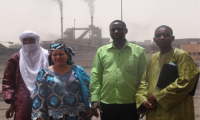Mining and oil industries in Niger threaten human rights

Economic growth is welcome in Niger, a land locked country in West Africa – and one of the world’s poorest nations. However, extractive industries might hurt local communities more than they contribute to progress.
That is the conclusion in a new baseline study that sheds light on a number of adverse human rights impacts of mining and oil industries in Niger by ROTAB, a coalition of civil society organisations in Niger. The team visited four different regions where uranium, gold and oil are being extracted. They met with affected community members and workers as well as with government and companies representatives, both multinational corporations, public entreprises and local sub-contracting companies.
“We had to face many challenges not least accessing extraction sites and relevant information. But we engaged with hundreds of stakeholders across the country and analysed key documents. Civil society organisations in Niger are now stronger to advocate for increased respect for human rights by business in Niger“, declared Naomi Stansly, the coordinator of the project on behalf of ROTAB.
Toxic waste and fumes
Local communities are very concerned about the dust and fumes, spillage of waste water and toxic material left behind by unscrupulous companies. The actual and potential consequences on human and animal health could be dramatic. In a semi-arid country like Niger, access to water has become a greater challenge for some communities with the arrival of extractive projects.
“The Nigerien Constitution protects human rights of citizens against adverse environmental and human rights impacts of extractives industries. But the reality we have seen on the ground is that poor communities living in the vicinity of such industries experience negative effects on their health and livelihoods. They are not adequately informed let alone consulted about the projects and their consequences. State agencies in charge of ensuring that private actors respect the legal framework lack adequate resources to do their work properly.” says Boukar Youra, The Danish Institute for Human Rights local human rights advisor who accompanied the research team all along the work.
No compensation for land grabs
Nomadic shepherd communities are being particularly hurt when they lose access to land but they are not being compensated for the loss, as they hold no formal land titles.
“This is a clear loophole in the legal framework that needs to be addressed as a matter of priority,” Boukar explains.
In the Tillabery region in western Niger, the team witnessed that artisanal gold miners use dangerous chemicals without any basic protection as well as a prevalence of child labour.
Representatives from NGOs and trade unions were initially trained on human rights and business by the Danish Institute for Human Rights experts and the core team of 9 people who carried out the project was supported by the Danish Institute for Human Rights local team all along the project which lasted for 18 months.
“The study is an excellent knowledge base for companies, state agencies and civil society to build on to increase their understanding of the issues and start a dialogue on actions that companies and the state need to take. The Danish Institute for Human Rights is supporting the development of National Action Plans on Business and Human Rights in several countries and is eager to support an ongoing dialogue leading up to such a comprehensive plan in Niger,” said Elin Wrzoncki, the Danish Institute for Human Rights’ expert on human rights and business who accompanied the team during this process.
The Danish Institute for Human Rights will continue its work in Niger through a new partnership with the Niger Commission on Human Rights, which has indicated business and human rights as one of its priorities.
Niger is a landlocked country in West Africa, with a population of approximately 17 million.
The capital is Niamey.
Three quarters of the Nigerien territory is desert.
The country has an abundance of natural resources, and currently uranium, coal, gold and oil are being extracted.
Indications of marble, iron ore, phosphate, lithium, cupper and diamonds have been found but are currently not exploited.
In 2010, the extractive industries represented 70,8 % of Nigerien exports, accounting for 5,8 % of GDP. Uranium is the primary export good.
